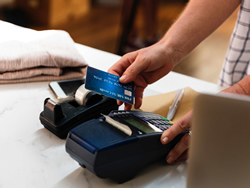Amy Fontinelle* says exercising restraint when it comes to buying on credit may seem difficult and boring, but it offers many rewards and advantages.
 With credit cards and lines of credit abundantly available, getting what you want right away has become common practice regardless of whether or not you have the cash to pay for it.
With credit cards and lines of credit abundantly available, getting what you want right away has become common practice regardless of whether or not you have the cash to pay for it.
There are many popular excuses for convincing yourself this immediate gratification is acceptable:
- You’ve had a rough week and deserve a treat.
- You’ll pay off the debt as soon as you get your paycheque.
- You need the item or service to help you lose weight or to improve your social life.
- You’ve waited long enough for the car, vacation or smartphone and aren’t willing to wait any longer.
Looking at these excuses, it isn’t hard to understand why we’ve become a nation of debtors.
Whether you need a gentle nudge to get back on track or basic knowledge to keep yourself out of trouble, here are nine ways to talk yourself out of drawing on credit.
- Financing purchases doesn’t teach self-control
At best, an unwillingness to exercise self-control when it comes to money can rob you of financial security.
At worst, an impulsive attitude toward buying can have a negative impact in other areas of your life, including self-esteem, substance abuse and interpersonal relationships.
Yes, exercising restraint may be difficult and boring, but it offers many rewards and advantages, from staying out of the hospital to affording your own home.
- Financing purchases means you aren’t sticking to the budget
What, you don’t have a budget?
Well, don’t despair because it’s easier than you think.
For many people, budgeting is a great tool for keeping spending under control.
It’s easy to forget how charging a cup of coffee here and a new book there can add up during the month and get you in trouble.
The solution is to plan your expenses and write everything down.
Budgeting can be as simple as making a list that shows how much money you earn in a month, followed by a running total of expenses.
The remaining balance will tell you how much you can spend.
- Interest rates are expensive
The reason self-control is so important when it comes to finances isn’t a moral or spiritual thing: It’s a practical thing.
Credit card interest rates are high, which makes your purchases more expensive.
If you don’t have the money to pay cash for something in the first place, you probably don’t want to make it more expensive by adding interest to the price.
If you buy an item for $1,000 using a credit card with an 18 per cent interest rate, for example, and make the minimum payment each month, you will end up paying $175 in interest after one year and still owe $946 on your purchase.
- Interest rates can increase when you don’t pay off balances
To add insult to injury, the great annual percentage rate (APR) you thought you had on your credit card may have been an introductory rate, subject to increase if the balance is not paid off in full.
That’s why an 8.99 per cent APR can easily skyrocket to a 29.99 per cent APR in the blink of an eye.
“But that will never happen to me,” you might say.
“I’ll pay my balance in full as soon as it’s payday.”
You may have the best of intentions but can get easily derailed by unanticipated expenses such as car repairs.
- A poor credit score can affect insurance rates, work potential and homebuying power
If credit card balances go unpaid, your credit score will start to diminish and you may get an unexpected rate increase on your insurance bill.
Insurance companies that check credit scores when calculating premiums may assume that if you can’t pay your bills, you might let your car or home maintenance slide, or you might be an irresponsible person, making you a higher risk.
Poor credit scores can generate other problems as well.
Some employers run credit checks on job applicants and may not hire you if your score is too low.
And your credit score is particularly important when purchasing or refinancing a home because it will determine the interest rate on your mortgage and whether you’re eligible for a mortgage in the first place.
- Poor financial habits can jeopardise relationships
Studies indicate that couples and families fight about money more than any other issue, and it can be an especially sensitive topic when there’s not enough of it.
As a result, couples and families should work on budgets and financial self-discipline together, whenever possible.
- Financing purchases can lead to higher spending
Many folks spend more money by purchasing unneeded or overly expensive items when they pay with credit instead of cash.
This is psychological because buying a $1,000 laptop or smartphone won’t seem as life changing if you just sign a receipt and don’t have to think about paying for a month.
On the other hand, you can physically feel the $100 bills leaving your hand if you pay with cash, giving you a better sense of how much those items cost and how much money you have left in your now-lighter wallet.
- The habit of financing purchases can lead to bankruptcy
If you go on enough spending sprees without a plan to pay them off, or if your plan goes awry because you lose your job or get hit with medical bills, you may find yourself hopelessly in debt.
Declaring bankruptcy will scar your credit history for up to 10 years and when the report finally goes away, you have to build good credit all over again.
- Avoiding financing can bring peace of mind
If you don’t owe money, you won’t have to worry about late fees, interest, annual fees or over-the-limit fees.
The best way to treat yourself to something nice is to save and buy it when you can truly afford it.
The peace of mind that comes with not financing that purchase will be like treating yourself twice.
The bottom line
Credit works well when balances are paid off each month but can be disastrous when poorly managed.
The convenience, protection and rewards offered by credit cards make them handy financial tools, but consider the risks before getting in over your head.
* Amy Fontinelle is a financial journalist and personal finance expert. She tweets at @AmyFontinelle and her website is www.amyfontinelle.com.
This article first appeared at www.investopedia.com.











